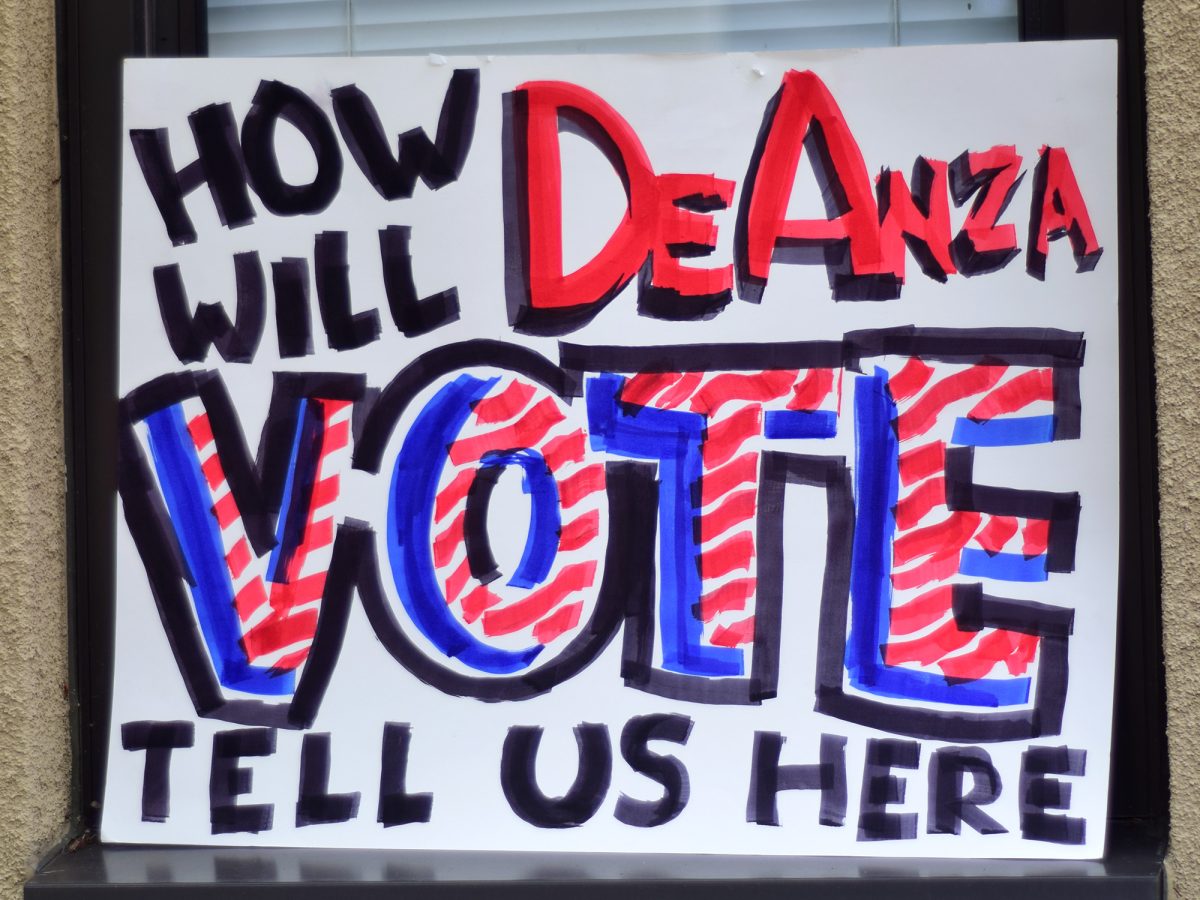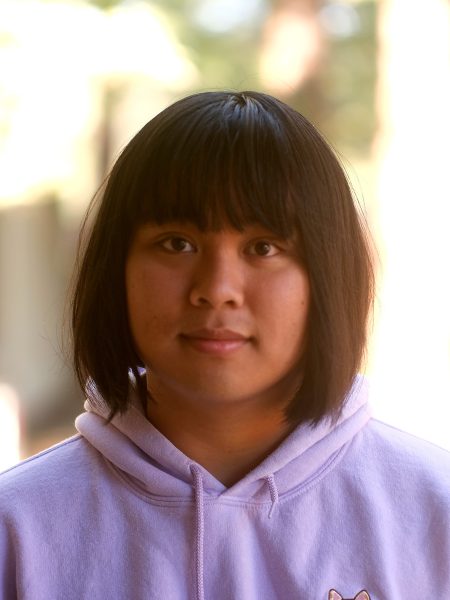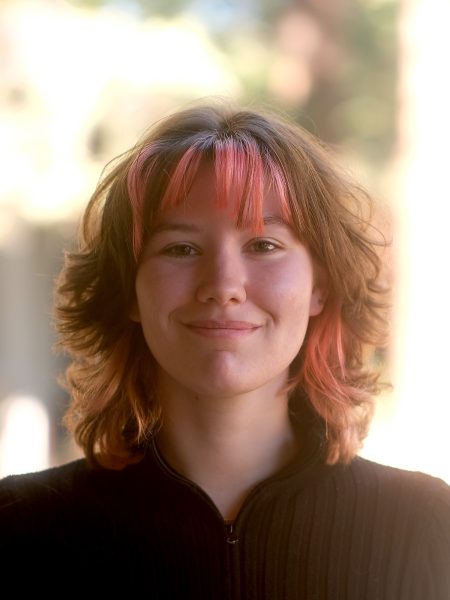Editor’s note: A previous version of this article that ran in print had four statistical mistakes. This has since been corrected. All percentages have also been standardized to two decimal places.
Before Donald Trump was elected president on Nov. 6, receiving both the electoral and popular votes, La Voz News conducted an informal poll in the Main Quad on Oct. 29 and Oct. 30. The goal was to find out if the De Anza community planned to vote in the 2024 election and who their preferred candidate was, regardless of whether they planned to vote or not. Here are the results:
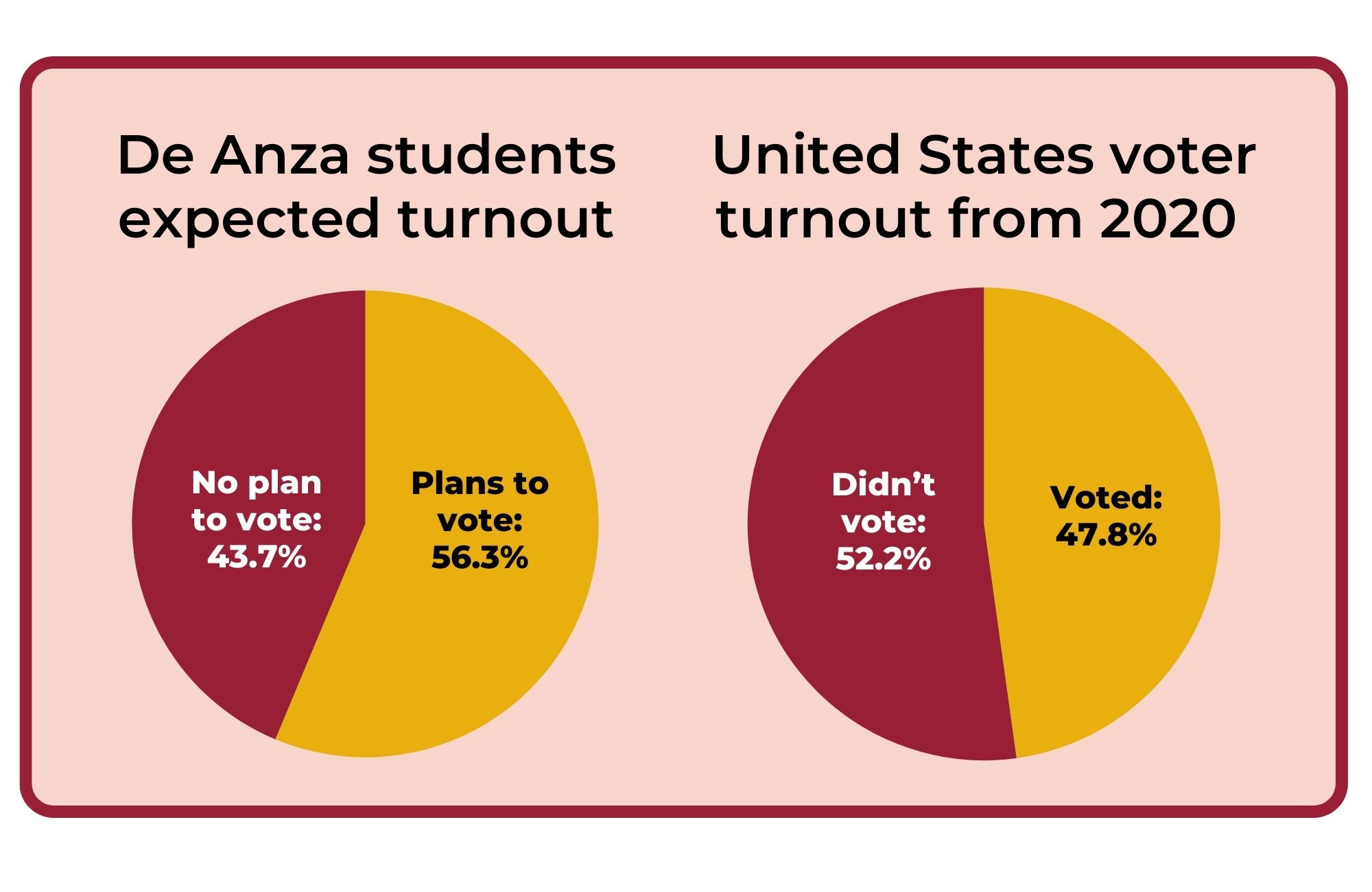
Out of 226 responses, 126 planned to vote in the election. The survey found that social science majors were projected to have the highest turnout, with 77.78% of respondents planning to vote or having already voted. Meanwhile, health science majors had the weakest predicted turnout at 45.00%.
At 55.75%, De Anza would have a better voter turnout than either California or the United States had in 2020 (44.98% and 47.80% of their total adult populations, respectively).
Despite the encouraging projections, some students still face obstacles to voting.
“I’m not really into politics,” Lana Tran, 18, a nursing major, said. Tran believes people should participate in elections, but feels she doesn’t know enough about it.
“I just don’t know where to start,” Katrina Luong, 18, a forensic science major, said. Luong, however, promises to prepare by researching candidates before the election.
Chris Sun, 30, a nursing major, said it’s important for citizens to participate in politics as a way to resolve their differences, but admitted that his busy school schedule left him little time to make voting plans or choose a candidate.
“It’s very difficult to vote for those two, for me personally,” Sun said. He worries that any elected candidate might push the country further toward political extremism, veering too far left or right.
“I think every vote matters,” Abad Khan, 18, a business major, said. “You should be standing firm on what issues you’re about.”
As an immigrant from Pakistan, Khan has seen firsthand the challenges of economic instability and hopes the results of the election will protect the United States from further economic inequality.
Abortion rights and the crisis in Palestine were most often cited as students’ primary issues this election cycle.
A major flaw of the poll was that it neglected to ask voter eligibility status. Among the respondents who did not intend to vote, some were below the legal voting age of 18, while many others cited a lack of U.S. citizenship as the reason they would not be voting.
Though this non-voter group was more likely to be impartial on who should be president, they believe this election holds real implications for their future. Isaak Yzakeev, 21, an international student and business major, said the most crucial matter is to stop the war in Palestine. After that, Yzakeev cares that green cards become available to non-citizen students. He plans to vote in the next election if the next president delivers on this item.
From South Korea, Yong Song, 24, a mechanical engineering major, is certain he would vote if he could. Song is most concerned about immigration and economic issues.
“Everybody should have their input on what goes around in the country,” Song said.“There’s so many underrepresented people in California that deserve to be represented.”
Kavi Kumaresan, 20, a film and television major and co-president of the Revolutionary Marxist-Periyarist Panthers club, is from India and also encourages eligible students to vote, but warns that democratic voting has its limitations.
So, how did De Anza vote?
The results show that students overwhelmingly voted for Kamala Harris and Tim Walz, with 51.77% supporting them, compared to 21.24% for Trump and Vance.
De Anza leaned more in favor of the Democratic Party nominee than the rest of California in 2020, 63.48% Democratic and 34.32% Republican.
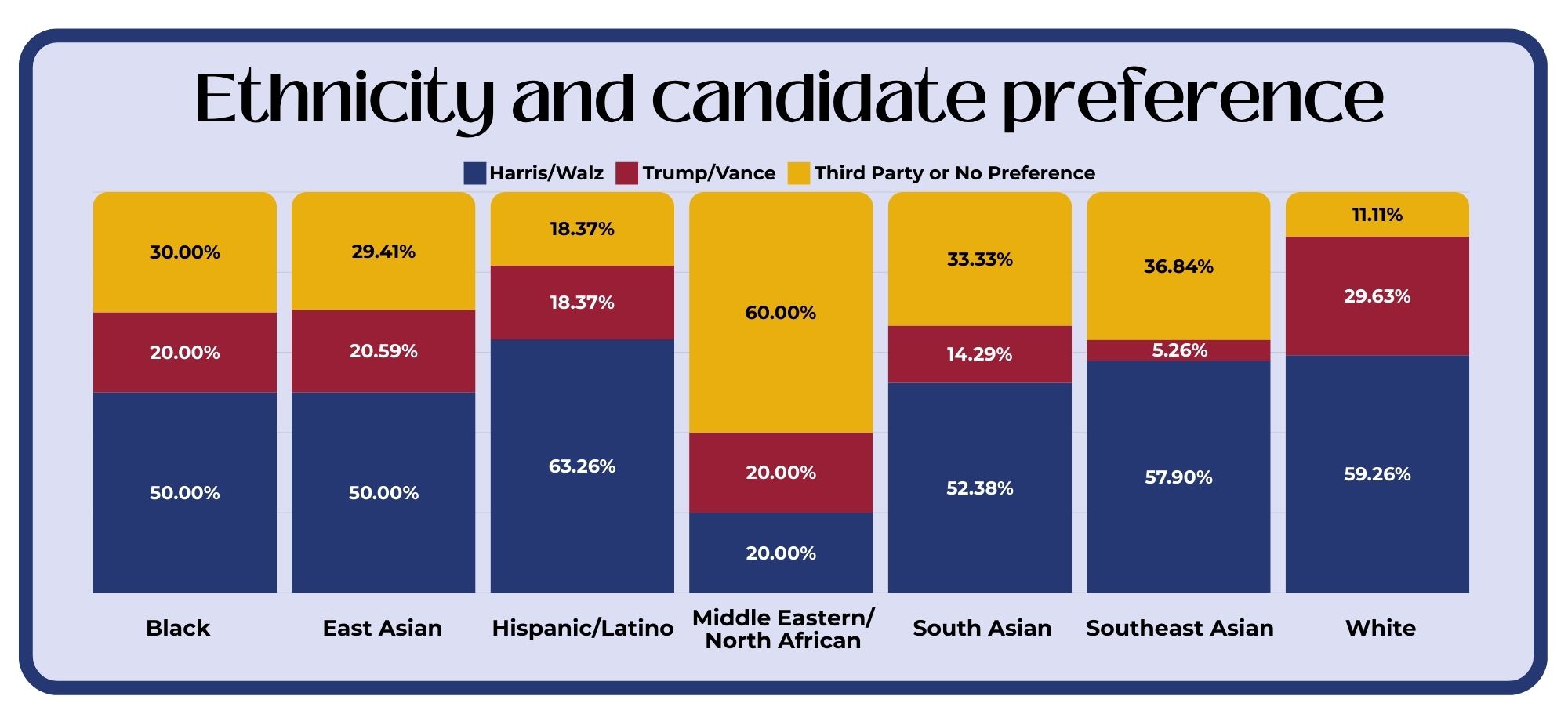
Overall, 63.26% of Hispanic or Latino respondents favored Harris, compared to 18.37% for Trump, and 76.19% favored Harris out of those who specifically identified as female.
White respondents were most likely to favor Trump (29.63%). However, 23 of the 27 students and faculty who identified as white also identified as male. From specifically white male respondents, 34.78% favored Trump.
Trump was also more popular among those who declined to provide any ethnicity, with 36.00% favoring Trump compared to 32.00% for Harris.
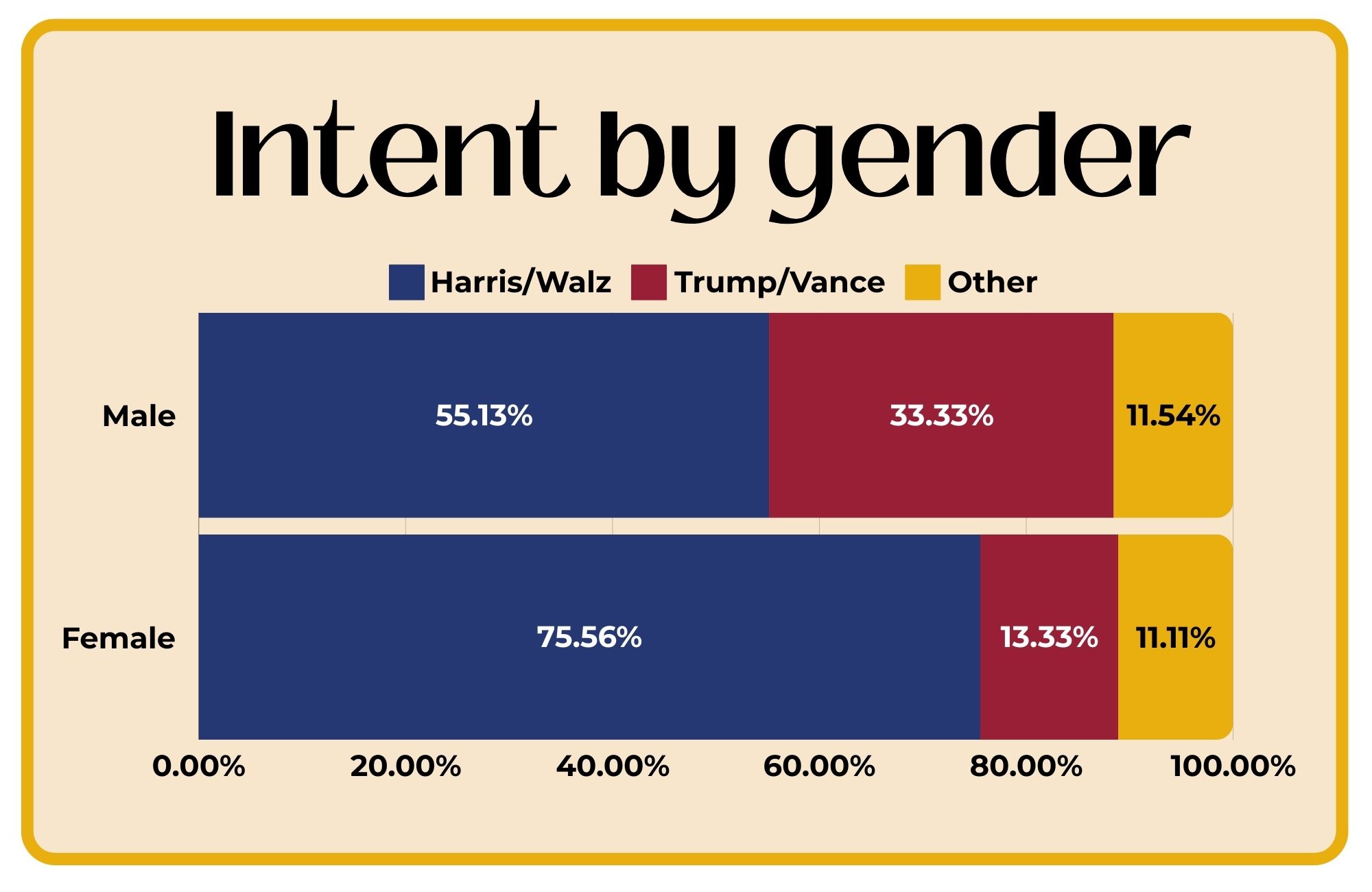
The highest favored third-party candidate, with 4.42% of the vote, was Jill Stein, who was most popular among students identifying as Middle Eastern or North African. Stein, the 2024 Green Party nominee, has been vocal about ending the conflict in Palestine. Claudia De la Cruz, the nominee from the Party for Socialism and Liberation, was also written in. Kanye West received one vote.




